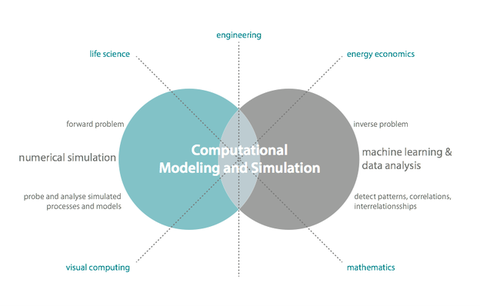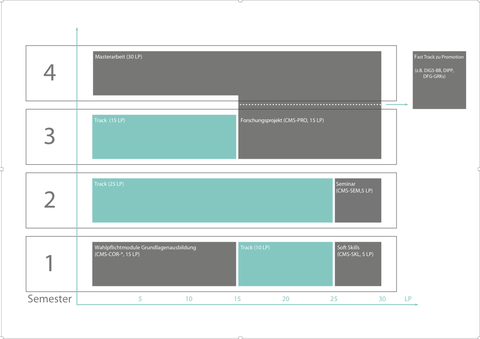Curriculum (will be updated in March 2026)
The standard duration of studies is four semesters, three for coursework and one for the master thesis. Students can enter the master’s program at the beginning of each winter semester. There is no possibility for part-time or extra-occupational enrollment.
For prerequisites and the application procedure please see Application
Degree
Graduates earn a Master of Science degree (M.Sc.) with a track-specific supplement.
Curriculum
The core curriculum teaches computational modelling (machine learning and data analysis) and computer simulation (numerical methods). The tracks cover a wide range of applications. We provide comprehensive mentoring throughout the entire master´s program.
The following tracks are currently offered:
- Computational Life Science (scholarships are available)
- Computational Mathematics
- Visual Computing
- Computational Modeling in Energy Economics (partially requires German language)
- Computational Engineering
- Applied Artificial Intelligence (scholarships are available)
- Computational Environmental Science and Engineering (planned)
Logical Modeling (last possible application in Winter semester 2024/25)
The program has a modular structure consisting of an application-independent core area and the application-specific tracks.
The core area includes (gray boxes in schematic above):
1st semester:
The soft skills module with language courses as well as the core modules. Depending on previous education, students must select at least three of the following ten core modules (each worth 5 credits):
- Statistical Principles and Experimental Design
- Basic Numerical Methods
- Scientific Software Engineering
- Machine Learning and Data Mining
- Stochastics and Probability
- Parallel Programming and High-Performance Computing
- Foundations of Artificial Intelligence
- Data Visualization
- Database Management
- Knowledge Models
At least three of these ten core modules shall be selected depending on previous education.
2nd semester:
Trans-disciplinary seminars; Analysis and discussion of scientific publications from at least two different fields of Computational Modelling and Simulation.
3rd semester:
Research module: Application of acquired knowledge in an independent research project.
Each track includes (blue boxes in schematic above):
1st semester:
Application-specific introductory lectures in the scope of 10 credits from the course catalogue of the respective track. (more choice with German language skills. Please see course catalogue for languages of instruction)
2nd semester:
Application-specific advanced courses in the amount of 25 credits from the course catalogue of the respective track. (more choice with German language skills. Please see course catalogue for languages of instruction)
3rd semester:
Application-specific advanced courses in the scope of 15 credits from the course catalogue of the respective track.
Note: Students with German language skills have a larger selection of courses. Please see course catalogue for languages of instruction.
The master's program focusses on equipping students with long-lasting transferrable knowledge and cross-application transfer competences. The former is achieved through the universally valid content of the core modules, and the latter is achieved through the cross-track seminars and the research project in a research group.
Modules of Track Computational Life Science:
- Computational Life Science Basics (10 credits)
- Introduction to Biochemistry (5 credits)
- Applied Bioinformatics (5 credits)
- Computational Life Science Advanced (10 credits)
- Computational Life Science Teamproject (10 credits)
- Modeling and Simulation in Biology (5 credits)
- Statistical Principles and Experimental Design (5 credits)
Modules of Track Computational Mathematics:
- Computational Mathematics Basics (10 credits)
- Finite Element Methods (prerequisite for module Modeling Case Studies, 5 credits)
- Modeling Case Studies (10 credits)
- Computational Mathematics Project (5 credits)
- Computational Mathematics Advanced (10 credits)
- Computational Mathematics Applications (10 credits)
Modules of Track Visual Computing:
- Visual Computing Basics (10 credits)
- Visual Computing Advanced (15 credits)
- Visual Computing Applications (15 credits)
- Visual Computing Teamproject (10 credits)
Modules of Track Computational Modeling in Energy Economics:
- Electric Power Markets (prerequisite for modules Case Studies in Energy Economics, Literature Studies in Energy Economics and Resource Economics and Environmental Policy, 5 credits)
- Computational Modeling in Energy Economics Basics (10 credits)
- Case Studies in Energy Economics (10 credits)
- Literature Studies in Energy Economics (5 credits)
- Resource Economics and Environmental Policy (10 credits)
- Computational Modeling in Energy Economics Advanced (10 credits)
Modules of Track Computational Engineering:
- Computational Engineering Basics (10 credits)
- Finite Element Method (5 credits)
- Advanced Topics in Finite Element Analysis Multifield Methods (5 credits)
- Multibody Dynamics (5 credits)
- Multifield Problems (5 credits)
- Computational Fluid Dynamics (5 credits)
- Computational Engineering Advanced (15 credits)
Modules of Track Applied Artificial Intelligence:
- Computer Vision (5 credits)
- Robot Learning (5 credits)
- Touch Sensing and Processing (5 credits)
- Digital Circuit Technology (5 credits)
- Deep Neural Network Hardware (5 credits)
- Advanced Applied Artificial Intelligence (5 credits)
- Applications of Applied Artificial Intelligence (10 credits)
- Applied Artificial Intelligence Teamproject (10 credits)


